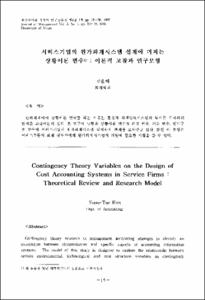WTO와 한국의 금융시장개방
- Alternative Title
- WTO and Financial Liberalization in Korea
- Abstract
- WTO 협정이 발효되면 GATS 제2부에서 규정하고 있는 일반적 의무 및 규칙인 최혜국 대우 및 공개주의 원칙을 준수하여야 한다. 이에 따라 외국 금융기관의 영업 활동을 국별로 차등규제하는 것은 불가능하게 되며, 내부지침 등의 형태로 운영되어 온 각종규제는 규정화하여 규제의 면료성을 확보하여야 한다. 따라서 금융시장개방은 가속화 될 것이다. 금융시장개방은 국내금리의 안정, 유리한 자금활용 기회의 확대, 금융산업의 발전 등의 순기능을 할 수도 있지만 외국자본의 급격한 유출입에 의한 국내경제에의 악영향으로 국가간의 금리차, 물가상승율 환율변동에 대한 예상에 근거한 투기성금의 유출입은 일국의 환율 및 통화관리정책의 운용을 어렵게 만들 수 잇다.
따라서, 금융기관들은 경쟁력 강화를 위한 전략적 경영으로 대형화전략과 업종별. 고객별 전문화전략 등을 검토할 수 있을 것이다. 또 한 여신운용방식의 개혁, 선진금융기법 및 신 금융상품의 도입과 개발을 통하여 시장개방에 대처하여야할 것이다. 그리고 정부는 자본시장개방에 따라 거액의 해외자본이 유입될 경우 국내경제에 미치는 부작용을 최소화하기 위하여 통화량, 환율정책을 적절히 조합하거나, 유입된 외화가 생산적인 부분으로 흘러 들어가도록하는 조칙 필요하며 해외직접투자, 해외증권투자 등의 자본유출정책을 적극 활용하여야 할 것이다.
When the WTO is established, each Member shall be obliged the Most-Favoured-Nation Treatment and the Transparency according to the Article Ⅱ and Ⅲ of the GATS Part Ⅱ. Therefore, it is impossible to treat any other Member less favourable than any other country. And each Member shall publish promptly laws, regulations or administrative guidlines which affect trade in service. So, financial liberalization will be acceralated in the future.
There are so many positive effects from the financial liberalization such as, stability of domestic interest rates, effective allocation of capital and development in the financial service industry etc. But it is so difficult to maintain the consistency of macroeconomic and exchange rates policies by capital inflow. Now financial institutions will pursue strategic managements such as globalization or specialization for the competitiveness. Also, authorities attempt to help achieve important economic goal through monetary and exchange rates policy mix.
When the WTO is established, each Member shall be obliged the Most-Favoured-Nation Treatment and the Transparency according to the Article Ⅱ and Ⅲ of the GATS Part Ⅱ. Therefore, it is impossible to treat any other Member less favourable than any other country. And each Member shall publish promptly laws, regulations or administrative guidlines which affect trade in service. So, financial liberalization will be acceralated in the future.
There are so many positive effects from the financial liberalization such as, stability of domestic interest rates, effective allocation of capital and development in the financial service industry etc. But it is so difficult to maintain the consistency of macroeconomic and exchange rates policies by capital inflow. Now financial institutions will pursue strategic managements such as globalization or specialization for the competitiveness. Also, authorities attempt to help achieve important economic goal through monetary and exchange rates policy mix.
- Issued Date
- 1995
- Type
- Research Laboratory
- Alternative Author(s)
- Choi,ByongCheol
- Publisher
- 사회과학논집
- Language
- kor
- Rights
- 울산대학교 저작물은 저작권에 의해 보호받습니다.
- Citation Volume
- 5
- Citation Number
- 1
- Citation Start Page
- 219
- Citation End Page
- 241
- Appears in Collections:
- Research Laboratory > Journal of social science
- 파일 목록
-
-
Download
 000002024295.pdf
기타 데이터 / 889.85 kB / Adobe PDF
000002024295.pdf
기타 데이터 / 889.85 kB / Adobe PDF
-
Items in Repository are protected by copyright, with all rights reserved, unless otherwise indicated.